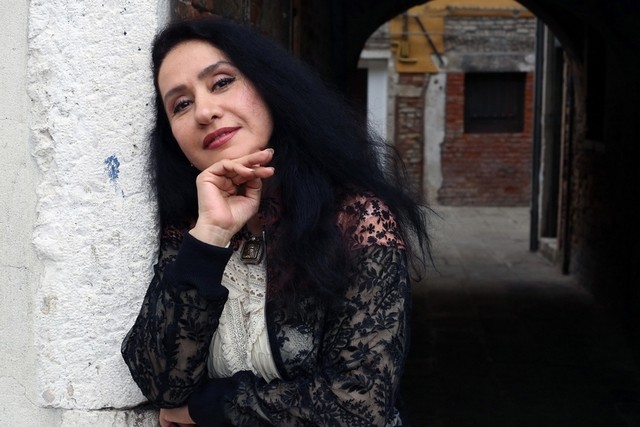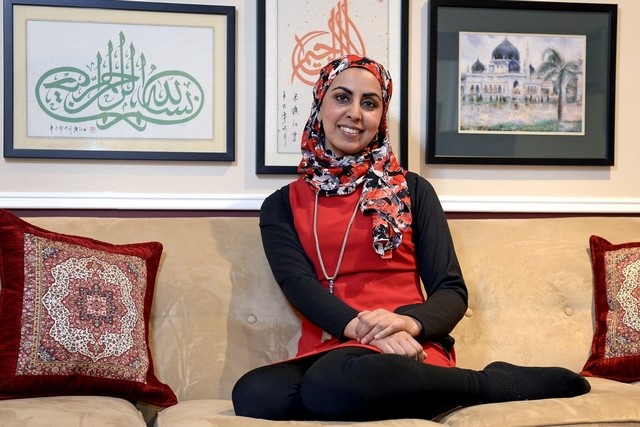When Raja Alem won the International Prize for Arabic Fiction in 2011 with The Dove’s Necklace, she might have expected that her fascinating exploration into contemporary, secretive Mecca would have enjoyed a swift translation into English.
After all, it was an intoxicating and timely combination of social history, memory and desire, all wrapped up in a teasing murder mystery.
Yet three years later, the book with which it shared the prize, Mohammed Achaari’s The Arch and the Butterfly, had enjoyed the translation treatment but there was little sign of a publishing deal for Alem’s equally significant book.
“For The Dove’s Necklace to emerge in English was something very important,” she says. “There were domains it could reach. It was like being somehow universal. But I always believe that there is a timing for everything and it’s a waste of energy to try to hasten that.”
Alem can be so philosophical because, finally, The Dove’s Necklace was published in English last week, translated by Katharine Halls and Adam Talib. It is a matter of some intrigue that it took so long, not least because Alem – who was born in Mecca in 1970 and divides her time between Jeddah and Paris – wrote the first draft in English. It is her second language which, she says, has always been “her means to connect to world literatures”.
Still, it wasn’t as if The Dove’s Necklace was completely overlooked by international markets [there have been French, German, Italian and Polish versions since 2011]. Alem says she was “so busy with the other translations that she didn’t really miss the English” .
But the five-year wait does beg the question of how Alem regards her book now. It felt very much of its time, particularly in the way it looked at how women saw themselves in a customs-heavy Saudi Arabian society grappling with new ways of living. Has much changed?
“Even when I wrote The Dove’s Necklace, it felt things were on the move – the women in the book were strong elements of change,” she says. “They were by no means passive, but fought their own battles to be themselves. They paid the price – but isn’t life about that? Making choices and paying for them?”
Perhaps, but when there are stories in newspapers – including one in The National last month – that women make up only 15 per cent of the workforce in Saudi Arabia, it does tend to suggest that the pace of change is still slow.
Well, I tend to think that women in Saudi Arabia are victims of preconceptions by those who claim to know the situation,” says Alem. “Despite everything, women are active and taking hold of their lives. The obstacles simply challenge them to develop more of their skills.
“This might sound idealistic, but really, when I see what women are bringing, and the roles they are playing in the country, I can’t help but feel the image inflicted on Saudi women is unjust. Of course, nowhere is ideal and there is a long way to go – as for every woman and every man on our planet – but steps are being taken and we all hope and work for more.”
Not that Alem has tempered any of her feminism.
“When they say Raja Alem is the first woman in the Middle East to win the Ipaf, they make it sound as if women are inferior creatures who achieved a trophy worthy of the males,” she says.
But perhaps some of her more considered gender politics come from a desire to look forward rather than dwell on the past – she says that it has taken her until now to read The Dove’s Necklace again.
“It’s like a wound,” she says. “It gives me pain, I can hover around it but not dig in.”
And though the Ipaf win “allowed her Mecca to be opened up to others from around the world”, it has not led to a further novel. Perhaps, in fact, all the talking about The Dove’s Necklace has distracted her from the business of actually being a novelist.
“Well, I do feel that though I’ve got this wider horizon and a greater distance from myself and my worlds, it’s taken away the seclusion I need to create,” she says. “I’ve never stopped writing, but I never talk about a book until it’s published. It defuses the energy needed to conceive a world.”
Alem needs that focus – she tells me that writing The Dove’s Necklace was “like a five year psychoanalysis of the city”, and her creative process involves long hours of writing until she falls into a dream state in which she can “follow a thread and surrender to its twists and flights”.”
All of which is a pretty neat way to describe the ambitious, evocative, sometimes hallucinatory feel to her writing.
“Right,” she says. “You know the feeling of falling asleep right into the depths of a dream? Writing is like that for me. Like being kidnapped into some sphere where everything else surrounding the book vanishes. The problem is, you then get kicked out of the dream, and you have to mould and rationalise your writing. It’s this that takes months…”
Not, though, as long as translating it.

